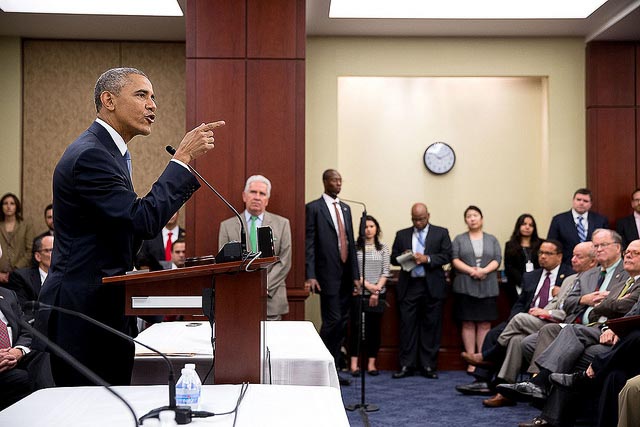In the days after the November 2016 election, discouraged White House staffers weren't hard to find. "The arc of the moral universe is long, but it bends toward justice," the president was fond of saying. Borrowed from Dr. Martin Luther King, Barack Obama made this phrase a hallmark of his campaign and presidency. But after the election, according to former senior staffer Ceclia Muñoz, Obama added a few of his own sentiments; "What made you think it was going to be a straight line? What made you think we were done?”
Muñoz served the full eight years with the Obama administration; three as Director of Intergovernmental Affairs and five as Director of the Domestic Policy Council.
Now, as the Vice President, Policy and Technology and Director of the National Network at New America, she's trying to take what she learned there and use it to help non-profits and local governments harness technology and innovation to improve lives.
"I am wired to be an optimist but I have what I can only describe as grief," she said, of watching the Trump administration dismantle years-worth of effort from her team. "It's painful to watch."
Still, she said she is hopeful. After all, she said Wednesday evening during the latest Kinder Institute Forum, America is still the country that elected Obama twice. And still the country that enslaved people. "We are all of those things," she said. "The most important lesson in all of this is that change is possible," said Muñoz. "I am undaunted in my optimism about what the American people can achieve."
In fact, some of her work is still in place, including 20 Promise Zone designations for communities across the country, including one in San Antonio, that provides them with technical assistance from the federal government as well as a boost when applying for federal grants.
Her team was also responsible for Strong Cities, Strong Communities, a program that placed federal officials on mayoral staffs across the country to help bridge divides between the two levels of government.
Both reflected a place-based strategy of investment that she continues today in her work with New America, stressing that local leaders know best about what their communities need. "There is real value in investing in places and looking at things that go beyond the education system or beyond housing," said Muñoz. "You have to look at all of it."
From her time in the White House, Muñoz said she took away five major lessons.
- "Collaborating turns out to be really hard... not because there isn’t an abundance of goodwill, but [because] it requires changing habits." Strong Cities, Strong Communities was an effort to shake up the traditional way of doing things at the city level. "The federal government is sort of this bewildering place where you have to tackle 18 different agencies," she said. "We tried to create one door for a mayor or community leader to come through and we tried to do the coordinating on our side of the door."
- "It's really important to be deliberate about who you want to reach." While at the White House, she focused not just on cities but rural and tribal places as well. And though they often worked with communities that were prepared to move forward and had some sort of plan in place, she said, "We looked for measures of improvement but we also looked for measures that indicated we were closing disparities."
- "Get creative." Faced with a less than cooperative Congress, Muñoz said the administration had to find creative ways to move policy forward. Proposals for free community college and expanded pre-K were unlikely to gain traction in Congress. "So we got creative with proposals like these and we took them around the country, we built coalitions," she said, encouraging support at the local level.
- "Learn from your mistakes." This lesson was particularly hard-earned, recounted Muñoz. "Some of them were pretty epic, including, I say still with pain, the failure of the healthcare website." But in response to that failure, the White House brought in folks from Silicon Valley to not only get that site up and running smoothly but to do "tours of duty" within federal departments.
- "Go beyond this notion of smart cities and be sure to focus on low capacity places." Though the White House partnered with high-capacity places, they also worked in Flint, Michigan and on the Pine Ridge Indian Reservation, said Muñoz. And regardless of capacity, she said, the technical assistance from the federal government was often more valuable than the money. But she also learned that for communities like Pine Ridge, which had strong local leadership but faced a long list of challenges, without that direct relationship, they were "on their own." It's something she is mindful of now as she seeks to find and scale innovations. "What worries me about the smart cities movement…we could end up in a situation where San Francisco has trash cans that talk to the city when they're full and Flint still doesn’t have water to drink," said Muñoz.
"Some people are surprised I left the administration with so much hope, but I did," said Muñoz. "There is a lot in America that we are doing right."

